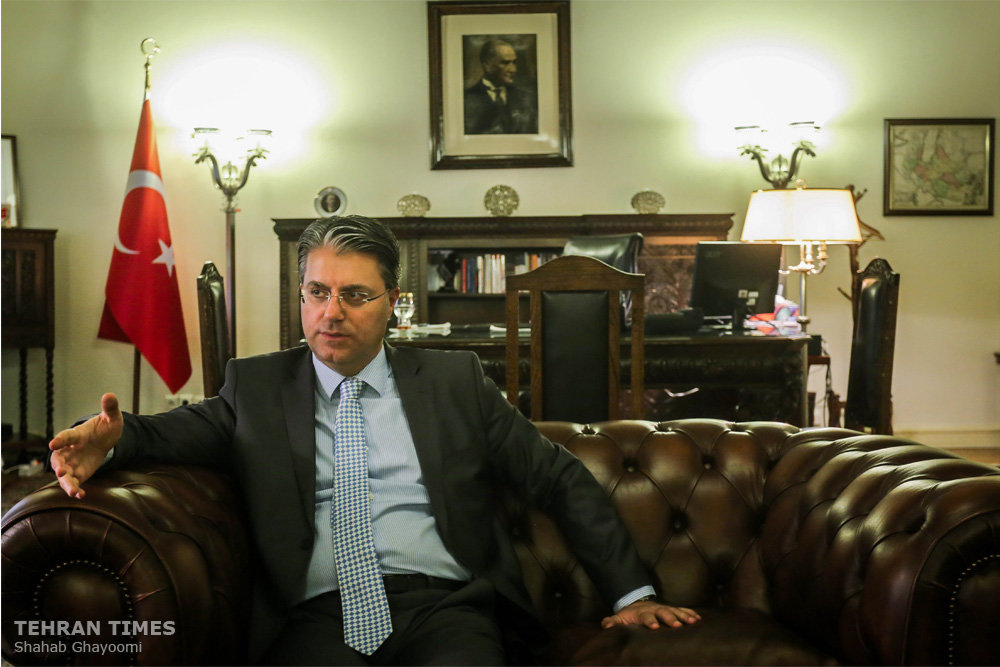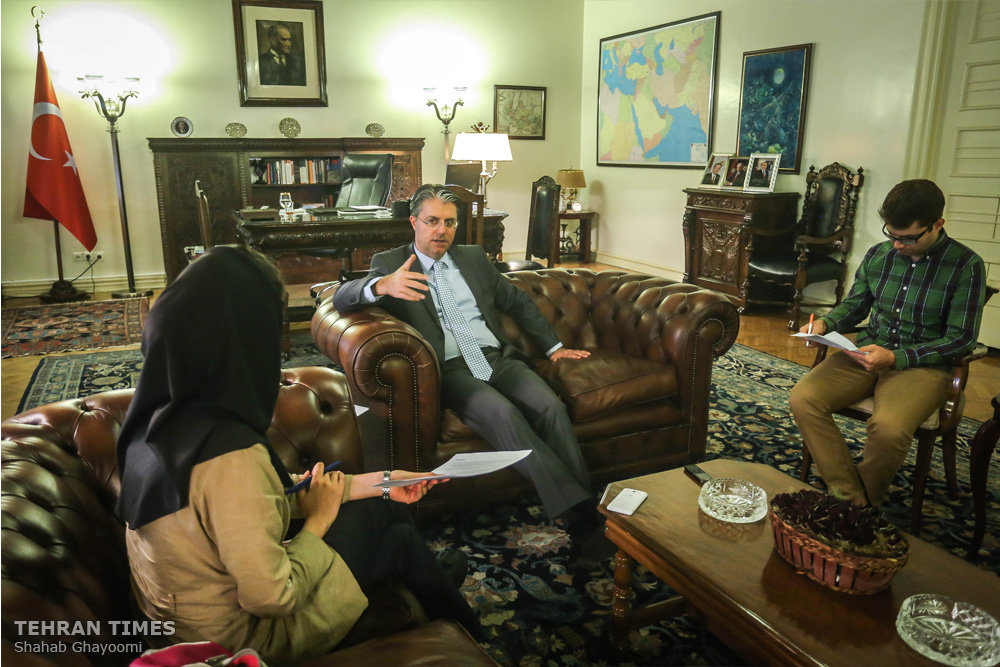Neighbors should prioritize unifying topics: Turkish envoy

TEHRAN – “It is high time regional countries focused on things that unite us rather than divide us,” the Turkish ambassador to Iran told The Tehran Times on Tuesday.
“Only then would we be able to delve into more difficult topics,” Riza Hakan Tekin said during an exclusive interview in his office at the Turkish embassy. “If you ignore Saudi Arabia, Turkey, or Iran, you will not reach a meaningful atmosphere of trust and cooperation.”
The ambassador likened neighbors to members of a family who may have differences but they should work together to iron out differences.
“No two countries in the world have identical policies or interests. We may always have differences with countries which we have close relations with, as is the case with the members of a family…. But in the bigger picture, we have cooperative relationships based on trust.”
When your economy is not that strong, when you don’t have much trade relations or investment relations, then you may not mind instability much because you don’t have much to lose.In response to a question on how political and economic issues influence Ankara’s approach toward the region, Mr. Hakan Tekin said, “The basic thing for any country is pursuing their national interests. Interests cannot be seen only in the economic sector. You should have stability, peace, and a reliable environment.”
“When you look at it from the economic angle, Turkey is one of the most developed countries in the region. It is the 16th biggest economy in the world - that is a fact - our GDP, our trade volume, and industrial base. We are poor in natural resources, oil and gas, but we did it through liberalizing our economy. When your economy is not that strong, when you don’t have much trade relations or investment relations, then you may not mind instability much because you don’t have much to lose. But that is not the case with us. We prosper from stability, because the more stability there is, the more economic transactions and investments there will be.”
“Unfortunately what our region has been going through in the last decade or so has brought challenges to our economy. But we managed to allay all those potential damages. We continued our prosperity and economic growth. When looking at a situation like Syria’s, we don’t look at it from an economic angle, like reasoning: ‘If we pursue Policy A we will make 10 million, and if we pursue Policy B we will gain 2 million, then let’s do Policy A.’ No, that’s not us.”
On Ankara’s approach toward the Trump administration, the ambassador said although the U.S. is an old ally and important country to Ankara, Turkey thinks the power transition in Washington is not still finished. “There are a lot of question marks, both in terms of policy and in terms of staffing - there are still very important posts in the U.S. administration left vacant. We have to wait and see. We don’t want to pre-judge. We hope for the best.”
‘Need to avoid politicization of issues’
Ambassador Hakan Tekin also said environmental problems facing the region should not alienate Iran and Turkey. Instead, he said, they should act as a “bridge” between the two neighbors.
There are a lot of question marks, both in terms of policy and in terms of staffing - there are still very important posts in the U.S. administration left vacant. We have to wait and see.“We should work together and not politicize the issue. It should be done in an objective, factual way…. It is not true that our dams on the Tigris and the Euphrates increase the chances of dust storms. However, regarding recent claims to that effect from Iran, we are ready to receive any argumentation that Iran has to justify their claims. We are always for dialogue.”
The diplomat also said his country was surprised by a sudden blockade of Qatar by Saudi Arabia and the UAE. Nevertheless, he said Turkey pushes for dialogue to settle the conflict.
“We were surprised like anybody else in the region about this crisis. Since we have close relations with Qatar and the other Arab countries, we wanted to do what we could to reach a quick resolution on the issue. A resolution which will satisfy everyone involved in this problem. Our president started the phone diplomacy in this respect and the last effort was the visit paid by the Turkish president to the region. When we look at how the crisis started and where we are now, we see changes in the situation in a positive way and we hope that we can dwell on that and we will continue our efforts, so that we can resolve this crisis.”
“We are already dealing with a lot of tension in the region and we do not need an additional one. We think it will not be in the interests of anybody, neither the countries which are directly involved in the crisis nor the other countries in the region including Turkey and Iran.
He added, “The Turkish president holds the presidency of the Organization of Islamic Cooperation which makes it an additional responsibility to make more efforts to bridge the differences between these countries.”

He also said though Turkey has a military base in Turkey it is not in animosity with each side of the conflict.
“There has been no secret relationship on that. Turkey and Qatar decided as independent (countries) to improve their military cooperation… and so made the agreement in 2014. Of course the base became more topical after the Qatari crisis, speculations rising that Turkey may use military power to support Qatar. But we are not adversaries with the other countries. We can have the same sort of relationship with others. It is not true that we are trying to create a sphere of influence in the region.”
Asked what he thinks of Tehran-Ankara cooperation on the Qatari crisis, he said, “Just a few days after start of the crisis Iranian Foreign Minister Mohammad Javd Zarif was in Turkey and we started consultations. Iran is a country that we keep a constant dialogue with. But after all it is the involved countries in the Qatari crisis which have to make the decision to solve this problem and we can only facilitate the process.”
Elsewhere, he answered a question about developing ties between Tehran and Ankara in the wake of last year’s failed coup in Ankara, saying, “We are of course very happy that Iran was one the first countries that supported our legitimate government after the coup attempt. This reflects the close relationship between the two countries which has historic roots. That is what friends are for. You need friends during hard times. That is why we have also supported Iran during the era of sanctions especially when we were at the UN Security Council. So, this a reflection of the pattern of the relations between Turkey and Iran… Yes, we may have some problems and differences, but when you look at the main tendency in our relations, it is always a relationship based on close engagement, dialogue and cooperation.”
The ambassador also said Turkey is still adamant in its position that President Assad must quit power in Syria.
“We have always been saying that Assad must go for a reason. We are not saying that Assad should go because we do not like him or because he belongs to a certain party. It is because what we have seen in Syria which is a neighboring country to us. Anything happens in Syria affects Turkey negatively. This influence includes both the security issues and other ones. Now, we are hosting more than three millions Syrians as refugees which is a burden to us and has social implications. We are happy to help our Syrian brothers and sisters, because that is what neighbors are for and we are not complaining about that. The reality is that we share borders and conflicts in either country will affect the other one.
“We say Assad should not have a role in Syria’s future, because we believe that he has the prime responsibility for the current situation in Syria. When you look at the policies and practices of the regime like bombarding the civilians in the name of fighting terrorism you see that it will not work.
“If we need peace and stability in Syria, we should have a meaningful transition of power in this country. This is agreed upon by the international community and the only thing left is to put this into practice.
“Syria is a very important country. The Syrians are very educated and civilized and they can produce a lot of options for their future rulers. It would not be a healthy approach if you tie the future of a country to just one person.”
The Turkish diplomat also said his country is against the proposed referendum in the Iraqi Kurdistan Region.
“We are not supporting that. We are against that, because one of the fundamental principles of our policy regarding our region is respecting territorial integrity. We believe withdrawing borders and making unilateral decisions without the consent of all the population is very dangerous and will have percussions beyond Iraq. It has been years that Iraq is going through instability and organizing a referendum in the Kurdistan region will spread the existing instability.”
NA/SP/PA
Leave a Comment